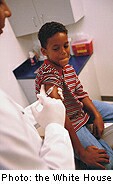
FRIDAY, Oct. 1 (HealthDay News) — The flu vaccine is safe for children with food allergies, experts say, as long as precautions are taken.
That assessment is being offered by a team of researchers at the Johns Hopkins Children’s Center in Baltimore, who noted that up to 3 percent of American kids harbor an allergy to eggs, raising concerns among parents who worry that the egg-based flu vaccine may spell trouble.
“Some parents are understandably concerned about allergic reactions to the flu vaccine and in the past may have opted against it, but the risk of catching the flu far outweighs the risk for an allergic reaction to the vaccine, and even children with egg allergies can be immunized safely,” Dr. Robert Wood, director of Allergy & Immunology at Hopkins Children’s, said in a news release from the center.
The issue of allergy risk is perhaps more front and center this year than in the past, given that this flu season U.S. health officials for the first time have decided to call for the vaccination of all children 6 months of age and up.
Previously, only children with high-risk medical conditions — such as asthma, diabetes, heart disease or neurological disorders and/or suppressed immune systems — were advised to get a flu shot.
The dilemma is further aggravated by the fact that while some vaccines do come in an allergen-free form, the flu vaccine is not among them.
Nevertheless, Wood said that most children with egg allergies can be vaccinated, as long as they undergo a skin-prick allergy test first to assess the severity of their allergy and to look for signs of antibodies against either the gelatin or egg proteins that are often found in vaccines.
Anti-allergy drugs, such as antihistamines and corticosteroids, are available and can be given pre-vaccination to minimize the risk of a reaction, he added.
Wood first teamed up with Hopkins pediatrician Dr. Neal Halsey to outline a safe approach towards the flu shot/allergy issue two years ago. At that time, the team advocated vaccination for almost all allergic kids as long as they undergo allergy testing, as well as close post-inoculation monitoring for a few hours by a physician.
The researchers noted that serious allergic reactions, which typically manifest very shortly (within minutes to a couple of hours) after vaccination, are actually extremely rare, occurring in just one or two patients per million.
That said, parents and physicians need to know that children with a prior history of allergic reactions are more prone to suffer future ones, and Wood stressed that those children already known to have a severe egg allergy should always be seen by a pediatric allergist before being immunized.
Immediate allergic reactions typically have a wide range of symptoms, including hives, swelling, wheezing, coughing, low blood pressure, vomiting and diarrhea. At times, full-blown anaphylaxis — a life-threatening allergic reaction — can occur, according to background information in the news release.
Delayed reactions manifesting days or weeks after the fact are usually not serious or life-threatening if they are diagnosed and treated promptly.
In that context, Wood said that those children with mild or unconfirmed allergies are usually good to go for a pediatrician-applied flu shot.
And now is a good time to book that appointment because Friday marks the unofficial start of the 2010-2011 flu season.
More information
For more on the flu vaccine and children, visit the U.S. Centers for Disease Control and Prevention.

